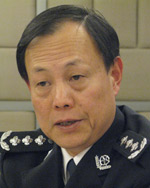580 economic fugitives still at large overseas
A total of 580 fugitives suspected of economic crimes are still at large in foreign countries, with most fleeing to North America and Southeast Asia, a senior police officer said.
|
Meng Qingfeng is head of the economic crime investigation department under the Ministry of Public Security. |
Meng Qingfeng, head of the economic crime investigation department under the Ministry of Public Security, said these fugitives have allegedly been involved in crimes including contract fraud, illegal fundraising, bank loan fraud and illegally transferring funds abroad.
"Most of them have escaped to North America and Southeast Asia," he told China Daily in an exclusive interview.
But he stressed that since 2007 the number brought back from abroad by Chinese police has exceeded that of new fugitives.
Chinese police have seized more than 250 fugitives in 20 countries and regions, including the United States and Canada, since 2006.
"On the one hand, economic crime investigation departments have stepped up efforts to trace and arrest fugitives who have fled abroad," Meng said.
"On the other hand, we have set up a prevention mechanism to effectively curb fugitives fleeing to other countries."
However, obstacles remain and Meng acknowledged that different social and legal systems between China and other countries have added to the difficulty in bringing back fugitives.
In recent years, a large number of Chinese criminal suspects have fled to Western nations, due to their ideological and legal differences with China, to escape punishment.
The biggest legal hurdle is an absence of extradition treaties between China and some Western countries. Trying to get fugitives back by another channel, such as by applying immigration laws, is more complex and involves lengthier procedures.
But progress has been made and China has signed extradition treaties with 37 countries and criminal justice agreements with 47 countries, Meng said.
The Ministry of Public Security hopes to increasingly cooperate with the international community and reach extradition agreements with more nations, he said.
"China will adhere to relevant international conventions to protect the human rights and other legitimate rights of the fugitives in line with China's laws and regulations," Meng said.
He appealed to fugitives to turn themselves in, saying that they will be treated in a just manner by judicial departments "within the legal framework".
One of the fugitives wanted in connection with economic crimes is Lai Changxing, the prime suspect in China's most notorious alleged smuggling operation, which was valued at $10 billion.
Lai, now living in Vancouver, Canada, is accused of masterminding the country's largest smuggling ring. He went to Canada in 1999 and China has been seeking his return to face charges of smuggling, bribery and tax evasion.
Hong Daode, a criminal law professor at the China University of Political Science and Law, said there are no clear regulations in Chinese criminal law to define the charge and sentencing escaped suspects should face.
"So it is more urgent to prevent the suspects from fleeing abroad while trying to enhance judicial cooperation with other countries to bring the fugitives back," Hong said.
 0
0 







